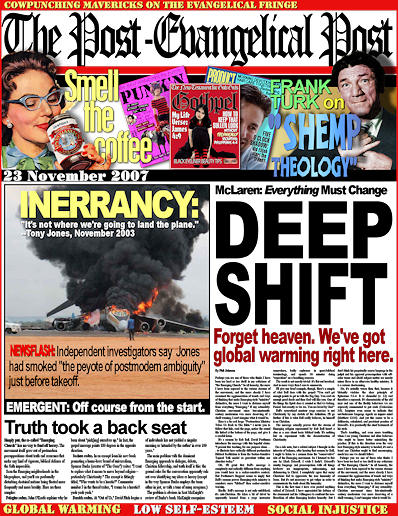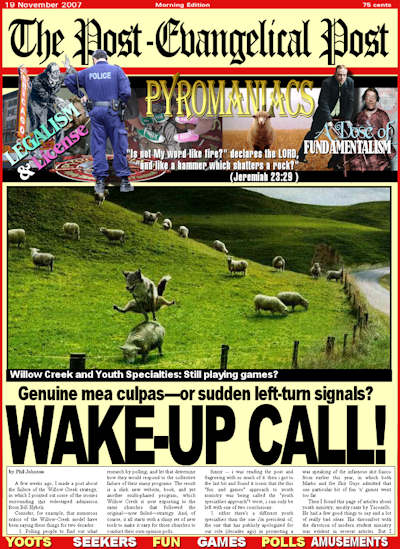by Dorothy Sayers

Dorothy Leigh Sayers (1893-1957) was the daughter of an Anglican pastor. Born at Oxford while her father was headmaster and chaplain of Christ Church Cathedral school there, she grew up in Cambridgeshire (the heart of Spurgeon country) and spent her college years at Oxford. (She was, as a matter of fact, one of the first women to earn a degree from Oxford.) In most ways she seemed an unlikely person to be an inflential lay theologian. Her main claim to fame was as a mystery writer and playwright. She had a turbulent romantic life and gave birth to a son out of wedlock (whose birth she kept secret even from her parents).
Sayers nevertheless kept the faith, holding devoutly to the same conservative Anglican perspective her father held. She was a friend of both C. S. Lewis and Charles Williams and thus a contemporary of the Inklings (but being a woman she was excluded from their get-togethers). Never one to shy away from controversy, Sayers had a gift for defending her views with grace and good humor. That quality is evident in this piece, which is as relevant today as is was when it was first published, posthumously, in The Poetry of Search and the Poetry of Statement (London: Gollancz, 1963).

fficial Christianity, of late years, has been having what is known as a bad press. We are constantly assured that the churches are empty because preachers insist too much upon doctrine—
dull dogma as people call it. The fact is the precise opposite. It is the
neglect of dogma that makes for dullness. The Christian faith is the most exciting drama that ever staggered the imagination of man—and the dogma
is the drama.
That drama is summarized quite clearly in the creeds of the Church, and if we think it dull it is because we either have never really read those amazing documents or have recited them so often and so mechanically as to have lost all sense of their meaning. The plot pivots upon a single character, and the whole action is the answer to a single central problem: "What think ye of Christ?" (Matthew 22:42). Before we adopt any of the unofficial solutions (some of which are indeed excessively dull)—before we dismiss Christ as a myth, an idealist demagogue, a liar, or a lunatic—it will do no harm to find out what the creeds really say about him.
What does
the Church think of Christ?
The Church's answer is categorical and uncompromising and it is this: That Jesus Bar-Joseph, the carpenter of Nazareth, was in fact and in truth, and in the most exact and literal sense of the words, the God "by whom all things were made." His body and brain were those of a common man; his personality was the personality of God, so far as that personality could be expressed in human terms. He was not a kind of demon pretending to be human; he was in every respect a genuine living man. He was not merely a man so good as to be "like God"; he
was God.
Now, this is not just a pious commonplace; it is not commonplace at all. For what it means is this, among other things: that, for whatever reason, God chose to make man as he is—limited and suffering and subject to sorrows and death—he [God] had the honesty and the courage to take his own medicine. Whatever game he is playing with his creation, he has kept his own rules and played fair. He can exact nothing from man that he has not exacted from himself. He has himself gone through the whole of human experience, from the trivial irritations of family life and the cramping restrictions of hard work and lack of money to the worst horrors of pain and humiliation, defeat, despair, and death. When he was a man, he played the man. He was born in poverty and died in disgrace, and thought it was worthwhile.
Christianity is, of course, not the only religion that has found the best explanation of human life in the idea of an incarnate and suffering god. The Egyptian Osiris died and rose again; Aeschylus in his play, The Eumenides, reconciled man to God by the theory of a suffering Zeus. But in most theologies, the god is supposed to have suffered and died in some remote and mythical period of prehistory. The Christian story, on the other hand, starts off briskly in St. Matthew's account with a place and a date: "When Jesus was born in Bethlehem of Judea in the days of Herod the King." St. Luke, still more practically and prosaically, pins the thing down by a reference to a piece of government finance. God, he says, was made man in the year when Caesar Augustus was taking a census in connection with a scheme of taxation. Similarly, we might date an event by saying that it took place in the year that Great Britain went off the gold standard. About thirty-three years later (we are informed), God was executed, for being a political nuisance, "under Pontius Pilate"—much as we might say, "when Mr. Johnson-Hicks was Home Secretary." It is as definite and concrete as all that.
Possibly we might prefer not to take this tale too seriously—there are disquieting points about it. Here we had a man of divine character walking and talking among us—and what did we find to do with him? The common people, indeed, "heard him gladly"; but our leading authorities in church and state considered that he talked too much and uttered too many disconcerting truths. So we bribed one of his friends to hand him over quietly to the police, and we tried him on a rather vague charge of creating a disturbance, and had him publicly flogged and hanged on the common gallows, "thanking God we were rid of a knave." All this was not very creditable to us, even if he was (as many people thought and think) only a harmless, crazy preacher. But if the Church is right about him, it was more discreditable still, for the man we hanged was God Almighty. So that is the outline of the official story—the tale of the time when God was the underdog and got beaten, when he submitted to the conditions he had laid down and became a man like the men he had made, and the men he had made broke him and killed him. This is the dogma we find so dull—this terrifying drama of which God is the victim and hero.

If this is dull, then what, in Heaven's name, is worthy to be called exciting? The people who hanged Christ never, to do them justice, accused him of being a bore—on the contrary, they thought him too dynamic to be safe. It has been left for later generations to muffle up that shattering personality and surround him with an atmosphere of tedium. We have very efficiently pared the claws of the Lion of Judah, certified him "meek and mild," and recommended him as a fitting household pet for pale curates and pious old ladies. To those who knew him, however, he in no way suggests a milk-and-water person; they objected to him as a dangerous firebrand.
True, he was tender to the unfortunate, patient with honest inquirers, and humble before heaven; but he insulted respectable clergymen by calling them hypocrites. He referred to King Herod as "that fox"; he went to parties in disreputable company and was looked upon as a "gluttonous man and a winebibber, a friend of publicans and sinners"; he assaulted indignant tradesmen and threw them and their belongings out of the temple; he drove a coach-and-horses through a number of sacrosanct and hoary regulations; he cured diseases by any means that came handy with a shocking casualness in the matter of other people's pigs and property; he showed no proper deference for wealth or social position; when confronted with neat dialectical traps, he displayed a paradoxical humor that affronted serious-minded people, and he retorted by asking disagreeably searching questions that could not be answered by rule of thumb.
He was emphatically not a dull man in his human lifetime, and if he was God, there can be nothing dull about God either. But he had "a daily beauty in his life that made us ugly," and officialdom felt that the established order of things would be more secure without him. So they did away with God in the name of peace and quietness.
"And the third day he rose again." What are we to make of this? One thing is certain: if he were God and nothing else, his immortality means nothing to us; if he was man and no more, his death is no more important than yours or mine. But if he really was both God and man, then when the man Jesus died, God died too; and when the God Jesus rose from the dead, man rose too, because they were one and the same person. The Church binds us to no theory about the exact composition of Christ's resurrection body. A body of some kind there had to be, since man cannot perceive the Infinite otherwise than in terms of space and time. It may have been made from the same elements as the body that disappeared so strangely from the guarded tomb, but it was not that old, limited mortal body, though it was recognizably like it. In any case, those who saw the risen Christ remained persuaded that life was worth living and death a triviality—an attitude curiously unlike that of the modern defeatist, who is firmly persuaded that life is a disaster and death (rather inconsistently) a major catastrophe.
Now, nobody is compelled to believe a single word of this remarkable story. God (says the Church) has created us perfectly free to disbelieve in him as much as we choose. If we do disbelieve, then he and we must take the consequences in a world ruled by cause and effect. The Church says further, that man did, in fact, disbelieve, and that God did, in fact, take the consequences. At the same, if we are going to disbelieve a thing, it seems on the whole to be desirable that we should first find out what, exactly, we are disbelieving. Very well, then: "The right faith is, that we believe that Jesus Christ is God and man, perfect God and perfect man, of a reasonable soul and human flesh subsisting. Who, although he be God and man, yet is he not two, but one Christ." There is the essential doctrine, of which the whole elaborate structure of Christian faith and morals is only the logical consequence.
Now, we may call that doctrine exhilarating, or we may call it devastating; we may call it revelation, or we may call it rubbish; but if we call it dull, then words have no meaning at all. That God should play the tyrant over man is a dismal story of unrelieved oppression; that man should play the tyrant over man is the usual dreary record of human futility; but that man should play the tyrant over God, find him a better man than himself, is an astonishing drama indeed. Any journalist, hearing of it for the first time, would recognize it as news; those who did hear it for the first time actually called it news, and good news at that; though we are likely to forget that the word Gospel ever meant anything so sensational.
Perhaps the drama is played out now, and Jesus is safely dead and buried. Perhaps. It is ironical and entertaining to consider that at least once in the world's history those words might have been spoken with complete conviction, and that was upon the eve of the Resurrection.
Dorothy L. Sayers
 posted by Phil Johnson
posted by Phil Johnson don't know who made this spot-on parody of Rob Bell's "Bullhorn Guy," but I want him to head the TeamPyro Film Division:
don't know who made this spot-on parody of Rob Bell's "Bullhorn Guy," but I want him to head the TeamPyro Film Division:





 Listen: there's no question that there are some people who are inside the boundaries of the church who, frankly, blow it. In fact, you cannot find any age of the church in which the church wasn't cross-populated with those who are in the unenviable position of needing the church most and also demonstrating they do not belong there. It goes back as early as the Galatian church, and the Corinthian church, and the Laodicean church – which were, btw, still called churches in spite of their problems.
Listen: there's no question that there are some people who are inside the boundaries of the church who, frankly, blow it. In fact, you cannot find any age of the church in which the church wasn't cross-populated with those who are in the unenviable position of needing the church most and also demonstrating they do not belong there. It goes back as early as the Galatian church, and the Corinthian church, and the Laodicean church – which were, btw, still called churches in spite of their problems.
 election cycle. When questioners bring up the matter of religion, or try to pursue it very far, one of the common preferred responses is, "My religion is very private. I keep it separate from my politics. My religion will not influence me one way or the other in office."
election cycle. When questioners bring up the matter of religion, or try to pursue it very far, one of the common preferred responses is, "My religion is very private. I keep it separate from my politics. My religion will not influence me one way or the other in office."

 friend of mine learned on Thanksgiving Day that he has terminal cancer. I visited him in the hospital that afternoon, and he was devastated. Doctors had discovered an inoperable tumor during surgery, and they simply stitched him back up. He now has all the pain and none of the benefit from that surgical procedure, which was extremely invasive. He was not much improved when I saw him again a couple of days later—after I had been to a memorial service for another friend's father.
friend of mine learned on Thanksgiving Day that he has terminal cancer. I visited him in the hospital that afternoon, and he was devastated. Doctors had discovered an inoperable tumor during surgery, and they simply stitched him back up. He now has all the pain and none of the benefit from that surgical procedure, which was extremely invasive. He was not much improved when I saw him again a couple of days later—after I had been to a memorial service for another friend's father. The
The  he tree can do without some of its branches, though the loss of them might be an injury; but it cannot live at all without its roots: the roots are essential; take those away, and the plant must wither. And thus my dear friends, there are things essential in the Christian religion. . . .
he tree can do without some of its branches, though the loss of them might be an injury; but it cannot live at all without its roots: the roots are essential; take those away, and the plant must wither. And thus my dear friends, there are things essential in the Christian religion. . . .

 he artist currently known as "Johnny Dialectic" cited a snippet in
he artist currently known as "Johnny Dialectic" cited a snippet in  Note: Rifkin's article was published exactly four years ago today. He was describing a more or less deliberate strategy to sell liberal and postmodern ideas to young evangelicals without upsetting the older conservative donor base. The key to the plan (as most of Rifkin's post-evangelical interviewees described it) was stealth, speed, and subterfuge. The "post-conservatives" were determined to infuse their talking points into the evangelical agenda before conservative evangelicals saw what was happening and hit back with any kind of "organized criticism."
Note: Rifkin's article was published exactly four years ago today. He was describing a more or less deliberate strategy to sell liberal and postmodern ideas to young evangelicals without upsetting the older conservative donor base. The key to the plan (as most of Rifkin's post-evangelical interviewees described it) was stealth, speed, and subterfuge. The "post-conservatives" were determined to infuse their talking points into the evangelical agenda before conservative evangelicals saw what was happening and hit back with any kind of "organized criticism." Apparently the Great Commission is not nearly as interesting to some Emergents as the media-relations handbook of the Democratic National Committee. Seriously. I'm currently reading Brian McLaren's Everything Must Change (in slow, small doses), and his list of The Biggest Problems in the World is borrowed straight from the doomsday eschatology of the secular left. As I've already noted
Apparently the Great Commission is not nearly as interesting to some Emergents as the media-relations handbook of the Democratic National Committee. Seriously. I'm currently reading Brian McLaren's Everything Must Change (in slow, small doses), and his list of The Biggest Problems in the World is borrowed straight from the doomsday eschatology of the secular left. As I've already noted 
 by Frank Turk
by Frank Turk Ultimately, Winter's connection to the stuff MTG listed is "clearly known", or can be "clearly known" with only a little effort, but here's the thing: I think we can't let ourselves get flap-jacked by someone with, um, an over-realized eschatology. We can't let someone's wacky redefinition of terms push us off the scriptural ground in which those terms ought to be planted.
Ultimately, Winter's connection to the stuff MTG listed is "clearly known", or can be "clearly known" with only a little effort, but here's the thing: I think we can't let ourselves get flap-jacked by someone with, um, an over-realized eschatology. We can't let someone's wacky redefinition of terms push us off the scriptural ground in which those terms ought to be planted. This is a big beef for me. The NT describes a church which is local, united, and discipling people toward two specific milestones: discipling toward personal maturity (cf. 1 Tim 1:5), and discipling toward making men into elders in the church (cf. Tit 1:5-9). That is, as Paul told Titus and Timothy, they were sent to preach the Gospel, teach it, exhort the people to live as an adornment of sound doctrine, and take the men who demonstrate this in life and practice and ordain them as elders.
This is a big beef for me. The NT describes a church which is local, united, and discipling people toward two specific milestones: discipling toward personal maturity (cf. 1 Tim 1:5), and discipling toward making men into elders in the church (cf. Tit 1:5-9). That is, as Paul told Titus and Timothy, they were sent to preach the Gospel, teach it, exhort the people to live as an adornment of sound doctrine, and take the men who demonstrate this in life and practice and ordain them as elders.
 enjoyed corresponding with Dan, and we plan to get together next time he's in
enjoyed corresponding with Dan, and we plan to get together next time he's in 


 few weeks ago, I made
few weeks ago, I made  Now (in matters only tangentially related to that)
Now (in matters only tangentially related to that)  But I've been looking for the apology Marko referred to. He might have been speaking of a famous article written by the late Mike Yaconelli:
But I've been looking for the apology Marko referred to. He might have been speaking of a famous article written by the late Mike Yaconelli:  Instead of reemphasizing the centrality of Scripture in what we teach our young people, Youth Specialties took a hard turn toward the leftward extreme of the Emergent spectrum. They now publish
Instead of reemphasizing the centrality of Scripture in what we teach our young people, Youth Specialties took a hard turn toward the leftward extreme of the Emergent spectrum. They now publish  eep praying for Frank Turk's child, whose allergic reaction didn't significantly improve with the first round of treatment. (I noticed Frank—who is obsessive about not exposing his family to Internet miscreants—didn't mention the child's name, age, and current location, so I won't either.) But the child, who is very young, was
eep praying for Frank Turk's child, whose allergic reaction didn't significantly improve with the first round of treatment. (I noticed Frank—who is obsessive about not exposing his family to Internet miscreants—didn't mention the child's name, age, and current location, so I won't either.) But the child, who is very young, was  taken to the emergency room this morning and given fluids and medication by IV for two hours—which had no perceptible effect.
taken to the emergency room this morning and given fluids and medication by IV for two hours—which had no perceptible effect..jpg) On a similar but entirely unrelated note, Darlene received word via e-mail yesterday that our good friend
On a similar but entirely unrelated note, Darlene received word via e-mail yesterday that our good friend 
 f you want to hold fast the truth, seek to get an understanding of it. A man cannot hold a thing fast, unless he has a good understanding of it. I never want you to have the faith of the collier who was asked what he believed; he said he believed what the Church believed. "Well, but what does the Church believe?" He said the Church believed what he believed, and he believed what the Church believed, and so it went all the way round.
f you want to hold fast the truth, seek to get an understanding of it. A man cannot hold a thing fast, unless he has a good understanding of it. I never want you to have the faith of the collier who was asked what he believed; he said he believed what the Church believed. "Well, but what does the Church believe?" He said the Church believed what he believed, and he believed what the Church believed, and so it went all the way round. I don't want people posting prayers in the meta or anything, but my wife and kids went travelling this weekend (I stayed home to watch the bookstore and teach sunday school), and on the way to where they were going one of my kids started complaining about being itchy all over. That child has been fighting strep for about 3 weeks, and the antibiotics haven't licked it yet, but skin bumps after strep can be indicative of something worse.
I don't want people posting prayers in the meta or anything, but my wife and kids went travelling this weekend (I stayed home to watch the bookstore and teach sunday school), and on the way to where they were going one of my kids started complaining about being itchy all over. That child has been fighting strep for about 3 weeks, and the antibiotics haven't licked it yet, but skin bumps after strep can be indicative of something worse.
 fficial Christianity, of late years, has been having what is known as a bad press. We are constantly assured that the churches are empty because preachers insist too much upon doctrine—dull dogma as people call it. The fact is the precise opposite. It is the neglect of dogma that makes for dullness. The Christian faith is the most exciting drama that ever staggered the imagination of man—and the dogma is the drama.
fficial Christianity, of late years, has been having what is known as a bad press. We are constantly assured that the churches are empty because preachers insist too much upon doctrine—dull dogma as people call it. The fact is the precise opposite. It is the neglect of dogma that makes for dullness. The Christian faith is the most exciting drama that ever staggered the imagination of man—and the dogma is the drama. If this is dull, then what, in Heaven's name, is worthy to be called exciting? The people who hanged Christ never, to do them justice, accused him of being a bore—on the contrary, they thought him too dynamic to be safe. It has been left for later generations to muffle up that shattering personality and surround him with an atmosphere of tedium. We have very efficiently pared the claws of the Lion of Judah, certified him "meek and mild," and recommended him as a fitting household pet for pale curates and pious old ladies. To those who knew him, however, he in no way suggests a milk-and-water person; they objected to him as a dangerous firebrand.
If this is dull, then what, in Heaven's name, is worthy to be called exciting? The people who hanged Christ never, to do them justice, accused him of being a bore—on the contrary, they thought him too dynamic to be safe. It has been left for later generations to muffle up that shattering personality and surround him with an atmosphere of tedium. We have very efficiently pared the claws of the Lion of Judah, certified him "meek and mild," and recommended him as a fitting household pet for pale curates and pious old ladies. To those who knew him, however, he in no way suggests a milk-and-water person; they objected to him as a dangerous firebrand.








